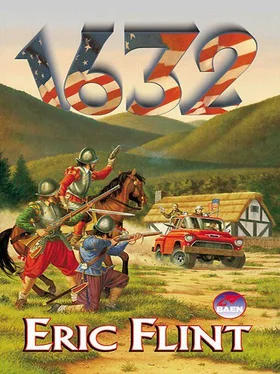***
More generally, the American characters who populate 1632 are all figments of my imagination. But I like to believe they are a faithful portrait of the American people. Part of the reason I chose to write this novel is because I am more than a little sick and tired of two characteristics of most modern fiction, including science fiction.
The first is that the common folk who built this country and keep it running-blue-collar workers, schoolteachers, farmers, and the like-hardly ever appear. If they figure at all, it is usually as spear carriers-or, more often than not, as a bastion of ignorance and bigotry. That is especially true of people from such rural areas as West Virginia. Hicks and hillbillies: a general, undifferentiated mass of darkness.
The second is the pervasive cynicism which seems to be the accepted "sophisticated" wisdom of so many of today's writers. (Not all, thankfully.) I will have no truck with it. Of all philosophies, cynicism is the most shallow and puerile. People may choose to believe that no young man like Jeff Higgins would ever make the decision concerning Gretchen which is portrayed in the novel. Yet that episode, like many in the book, was inspired by real life. A young American infantryman, who encountered a prostitute caring for her family during the Italian campaign in World War II, made exactly the same decision-and, like Jeff, made it within hours. Do not ask me his name, or where he came from, because I do not remember. I ran across the story in a history book which I read as a teenager. The specifics I forgot long ago, but I never forgot the incident. He may have been a boy from West Virginia or Kansas-but he could just have easily have come from the mean streets of New York. If there is one human characteristic which truly recognizes neither border, breed nor birth, it is the courage to face life squarely.
As for the coal miners who are central to the story, people may think the portrait unrealistic. That is their problem, not mine. I never had the honor of being a member of the United Mine Workers of America. But in my days as a trade-union activist, I had many occasions to work with the UMWA and its members. I know the union and its traditions, and those traditions are alive and well. That is as true of the Navajo miners in the southwest and the strip miners in Wyoming as it is of the Appalachian core of the union. I began this book by dedicating it to my mother, who comes from that Appalachian stock. Let me end by rededicating it to UMWA Local 1972 of Sheridan, Wyoming, especially to Dan Roberts and Ernie Roybal; and to Maurice Moorleghen, who came up from District 12 in southern Illinois to lend a hand.
Eric Flint East Chicago, Indiana August 1999
THE END
For more great books visit
http://www.webscription.net/
Table of Contents
Prologue
Part One
Chapter 1
Chapter 2
Chapter 3
Chapter 4
Chapter 5
Chapter 6
Chapter 7
Chapter 8
Chapter 9
Chapter 10
Chapter 11
Chapter 12
Chapter 13
Chapter 14
Part Two
Chapter 15
Chapter 16
Chapter 17
Chapter 18
Chapter 19
Chapter 20
Chapter 21
Chapter 22
Chapter 23
Chapter 24
Chapter 25
Chapter 26
Chapter 27
Chapter 28
Chapter 29
Chapter 30
Chapter 31
Chapter 32
Chapter 33
Part Three
Chapter 34
Chapter 35
Chapter 36
Part Four
Chapter 37
Chapter 38
Chapter 39
Chapter 40
Chapter 41
Chapter 42
Chapter 43
Chapter 44
Part Five
Chapter 45
Chapter 46
Chapter 47
Chapter 48
Part Six
Chapter 49
Chapter 50
Chapter 51
Chapter 52
Chapter 53
Chapter 54
Chapter 55
Chapter 56
Chapter 57
Chapter 58
Part Seven
Chapter 59
Chapter 60
Chapter 61
Author's Afterword











